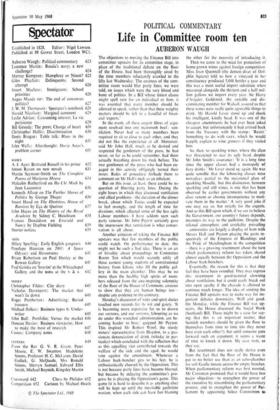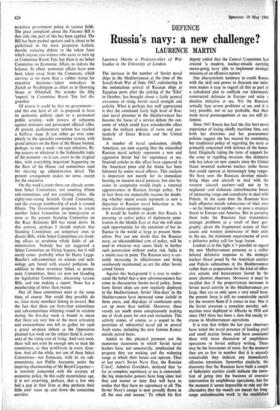Life in Committee room ten
POLITICAL COMMENTARY
AUBERON WAUGH
The objections to moving the Finance Bill into committee upstairs for its committee stage, in place of the traditional debate on the floor of the House, had been thoroughly aired by the time members reluctantly crawled to the lifts last Wednesday. The cosiness of the com- mittee room would blur party lines, we were told, on issues which were the very blood and bone of politics. In a Bill whose tiniest clause might spell ruin for an individual or firm, it was essential that every member should be allowed to speak, rather than that these weighty matters should be left to a handful of finan- cial 'experts.'
In the event, all these cogent fibres of argu- ment resolved into one mammoth beef: ven- tilation. Never had so many members been required to sit so close to each other, and they did not like the experience at all. Moreover, said Mr John Hall, much as he desired and respected the gentlemen of the press, he had never, so far as he could remember, had them actually breathing dour) his neck before. The two gentlemen of the press who had been en- gaged in this activity obligingly turned their noses. Rules of procedure forbade them to comment on Mr Hall's neck as an inhalant.
But on this issue, at least, there could be no question of blurring party lines. During the eight hours in which they discussed ventilation and allied problems—the duration of the dinner break, about which Tories could be expected to feel strongly, and the length of time for divisions, which affected some of the less agile Labour members—I have seldom seen such party rancour. Mr John Peyton certainly gave the impression that ventilation is what conser- vatism is all about.
Another criticism of taking the Finance Bill upstairs was that few members of the public could watch. On performance to date, this might not be such a bad idea. There is an air of frivolity about proceedings in Committee Room Ten which would scarcely edify all those earnest young students of constitutional history from Ghana who fill the public gal- lery the main chamber. This may be no more than the healthy high spirits of mem- bers released from the awe-inspiring solemnity of the floor of the House of Commons, anxious to show that they are human beings too— despite any evidence to the contrary.
Monday's discussion of wine and spirit duties touched new records for its wit and gaiety. 'It is becoming more expensive for us to drown our sorrows, and our sorrows, labouring as we do under this wretched administration, are be- coming harder to bear,' quipped Mr Peyton. This inspired Mr Robert Woof, the sturdy miners' representative from Blaydon, to a pas- sionate denunciation of drink (whisky in par- ticular) which concluded with the reflection that as this appalling vice contributed towards the welfare of the sick and the aged, he would vote against the amendment. Whenever a Labour back-bencher gets to his feet, he is enthusiastically cheered by the Opposition. This is not because party lines have become blurred, but because by delaying the committee's pro- gress be is playing the Opposition's game. This game (it is hard to describe it as anything else) will be kept up until the inevitable guillotine motion, when each side can have fun blaming the other for the necessity of introducing it.
Then we came to the need for protection of home-grown wines against foreign competition. Miss Joan Quennell (the demon diver of Dol- phin Square) told us how a vineyard in her constituency produced 5,000 bottles a year and this was a most useful import substitute when measured alongside the thirteen and a half mil- lion gallons we import every year. Sir Harry d'Avigdor Goldsmid, the amiable and dis- criminating member for Walsall, assured us that these wines were really quite agreeable things to drink. Mr Harold Lever stood up and shook his intelligent, kindly head. It was one of the cheapest amendments he had ever been asked to accept, but unfortunately it had arrived back from the Treasury with the stamp: 'Resist.' Something to do with GATT, which he would happily explain to wine growers if they visited him.
So, then, to sparkling wines, where the class war threatened to rear its ugly head, despite Mr John Smith's assurance: 'It is a long time since the upper classes had a monopoly of fizzy drinks.' Mr Lever stood up again. He was quite sensible that the labouring classes were nowadays partial to the occasional glass of sparkling Moselle. 'but this distinction, between sparkling and still wines, is one that has been observed by earlier governments without any class venom or chronic incompetence to moti- vate them in the matter.' A very good joke if one may say so, but strictly for the experts. And so this Bill upon which, if we are to believe the Government. our country's future depends, meanders its way to the guillotine. Despite the relaxed atmosphere and cordiality prevailing —animosities are largely a display of ham with Messrs Hall and Peyton playing the parts re- spectively of the Empress of Blandings and the Pride of Matchingham in the competition —there is a gnawing resentment about the turn which parliamentary reform has taken, shared almost equally between the Opposition and the Labour back-benchers.
Essentially, the reason for this is that they feel they have been swindled. They may express this resentment in good-natured clowning about ventilation, but it could easily brsak out into open apathy if the charade is allowed to continue much longer. The idea of sending the Finance Bill upstairs was to make way for im- portant debates downstairs. Well and good. On Monday, while the Finance Bill was up- stairs, the House discussed the Social Work (Scotland) Bill. There might be a case for say- ing that this is an important matter, that Scottish members should be given the floor to themselves from time to time (do they never bore even each other?), but until someone puts forward such an argument, it seems a waste of time to knock it down. My case rests, as they say.
But resentment does not really derive even from the fact that the floor of the House is put to no better use than as an echo-chamber for soft Gaelic moans across the empty benches. When parliamentary reform was first mooted, Mr Crossman promised that it would have two major objectives—to strengthen the power of the executive by streamlining the parliamentary process, and to strengthen the power of Par- liament by appointing Select Committees to scrutinise government policy in various fields. The great complaint about the Finance Bill is that only one part of this has been applied. The Bill has been pushed upstairs and is about to be guillotined in the most purposive fashion, thereby reducing debate to the token farce which anyone can witness who cares to turn up at Committee Room Ten, but there is no Select Committee on Economic Affairs to redress the balance. In effect, economic affairs have now been taken away from the Commons, which survives as no more than a rubber stamp for executive decisions—taken nowadays in Zurich or Washington as often as in Downing Street or Whitehall. No wonder the fifty 'experts' in Committee Room Ten feel dis- gruntled.
Of course it could be that no government— and this one least of all—is prepared to have its economic policies open to a permanent public scrutiny, with powers of subpoena against ministers and permanent officials -alike. At present, parliamentary reform has reached a halfway stage. It can either go over com- pletely to the specialist committee system, with grand debates on the floor of the House limited, perhaps, to one a week—on race relations, fly- ing saucers or whatever is the fashionable topic of the moment—or it can eevert to the original idea, with everything important happening on the floor of the House and committees used for clearing up administrative detail. The present arrangement makes no sense, except for the executive.
On this week's count there are already seven- teen Select Committees, not counting fifteen sub-committees and not counting, either, the eighty-one-strong Scottish Grand Committee, and the average membership of each is around fifteen. The Government proposes to create another Select Committee on immigration as soon as the present Standing Committee on the Race Relations Bill has stood down. In this context, perhaps I should explain that Standing Committees are temporary ones to discuss Bills, while Select Committees are stand- ing affairs to scrutinise whole fields of ad- ministration. Nobody has yet suggested a Select Committee on Flying Saucers, but it will surely come—probably when Sir Harry Legge- Bourke's sub-committee on science and tech- nology gets bored with coastal pollution. In addition to these seventeen Select, or perma- nent, Committees, there are now ten Standing (or legislative) Committees, discussing various Bills, and one making a report. None has a membership of fewer than twenty.
Not all these committees meet at the same time, of course. Nor could they possibly do so, since many members belong to several. But the fact that there are forty-four committees and sub-committees whizzing round in rotation during the five-day week is bound to mean that there are very few of the more articulate and conscientious mils left to gather for such a grand set-piece debate as the Opposition planned last week on the subject (hold it, every- one) of the rising cost of living. And very soon, there will not even be enough MPS to man the committees, as they proliferate in every direc- tion. And all the while, not one of these Select Committees—not Estimates, with its six sub- committees, nor Public Accounts, under the inspiring chairmanship of Mr Boyd-Carpenter- is remotely concerned with the scrutiny of economic policy. In this sadly materialistic age, It is not surprising, perhaps, that a few sus feel a gap in their lives as they perform their little ants' races up and down the committee corridor.







































 Previous page
Previous page